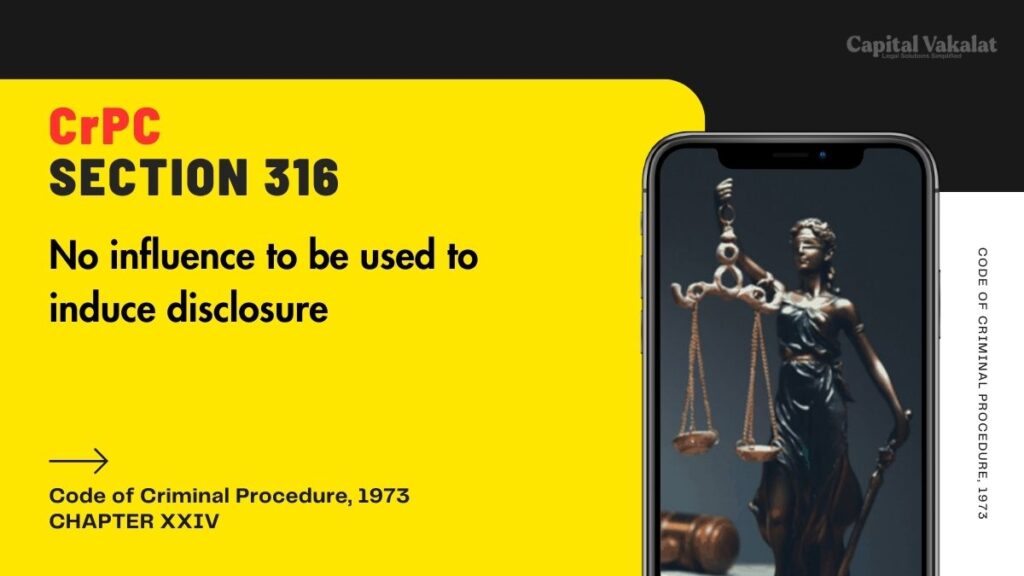In the context of criminal law, Section 316 of the Code of Criminal Procedure (CrPC) stands as a crucial safeguard. It ensures that no undue influence is exerted to induce the disclosure of information. This article delves deep into the provisions of Section 316 CrPC, its significance, and its application in legal proceedings.

Section 316 CrPC holds a vital place in the judicial system. Its primary objective is to protect individuals from coercion and undue pressure during interrogations. By prohibiting any influence to induce disclosure, this section aims to maintain the integrity of the judicial process and safeguard the rights of the accused.
Bare Act. Section 316 Cr.P.C.
No influence to be used to induce disclosure.
Except as provided in sections 306 and 307, no influence, by means of any promise or threat or otherwise, shall be used to an accused person to induce him to disclose or withhold any matter within his knowledge.
The Legal Framework of Section 316 CrPC
The Code of Criminal Procedure, 1973, which governs the procedural aspects of criminal law in India, includes various sections to ensure fair and just trials. Section 316 specifically addresses the issue of influence during disclosure. It mandates that no person shall use any promise, threat, or inducement to obtain a statement or disclosure from the accused or witness.
Historical Context of Section 316 CrPC
Understanding the historical backdrop of Section 316 CrPC is essential. The provision traces its roots back to the British colonial era, where the need to prevent coercive practices during interrogations was recognized. Over time, the Indian legal system has evolved, but the essence of this protection remains unchanged.
Application in Modern Legal Proceedings
In contemporary legal proceedings, Section 316 CrPC serves as a cornerstone of ethical interrogation practices. It ensures that any statement or disclosure made by an accused or witness is voluntary and free from any external pressure. This not only upholds the rights of individuals but also enhances the credibility of the judicial process.
Case Studies Highlighting Section 316 CrPC
Several landmark cases have underscored the significance of Section 316 CrPC. These cases illustrate how the judiciary interprets and enforces this provision to ensure that disclosures are made without any undue influence. By examining these case studies, we gain insight into the practical application of this crucial section.
Challenges in Implementation
Despite its importance, the implementation of Section 316 CrPC faces challenges. Ensuring that all law enforcement officers and judicial authorities adhere to this provision requires continuous training and monitoring. Additionally, there are instances where allegations of coercion during interrogations surface, highlighting the need for stringent enforcement.
International Perspectives on Coercion in Legal Systems
Examining international perspectives on coercion and disclosure in legal systems provides a broader understanding of Section 316 CrPC. Many countries have similar provisions to protect individuals from undue influence during interrogations. Comparing these practices helps in appreciating the global commitment to fair legal processes.
Future Directions for Section 316 CrPC
The legal landscape is constantly evolving, and so are the challenges associated with ensuring voluntary disclosures. Future directions for Section 316 CrPC could include more robust mechanisms for monitoring interrogations, enhanced training for law enforcement, and greater public awareness about the rights of the accused.
Conclusion
Section 316 CrPC: No Influence to Be Used to Induce Disclosure stands as a pillar of justice in the Indian legal system. It protects individuals from coercion, ensuring that any disclosure is voluntary and credible. By upholding this provision, the judiciary reinforces the principles of fairness and integrity that are fundamental to a just society.